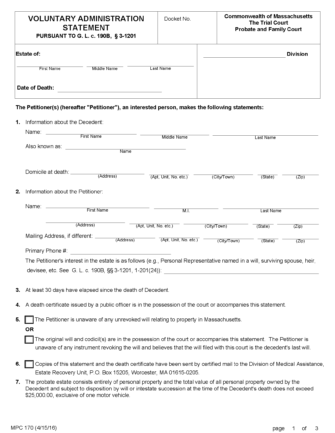

A Massachusetts small estate affidavit, officially titled the “Voluntary Administration Statement (MPC 170),” is a petition to settle the estate of a deceased person (the decedent) without a formal probate hearing. It may be admitted to the Probate and Family Court by anyone with an interest in the decedent’s estate, such as a spouse, child, joint property owner, or creditor. If approved, the petitioner will be appointed Voluntary Personal Representative of the estate and may distribute assets in accordance with the decedent’s will or, if no will exists, as otherwise authorized by law.
Eligibility for voluntary administration is limited to estates valued at $25,000 or less, not including the value of any motor vehicles titled in the decedent’s name. In addition, the estate must be comprised of personal property only (i.e., it cannot include real estate).
Massachusetts offers a simplified probate procedure known as “voluntary administration,” which may be used regardless of whether the decedent died with or without a valid will. The following requirements must be met in order to be eligible for voluntary administration:
To open a voluntary administration proceeding, the petitioner will need to prepare and collect the following documents:
Note: Copies of the Voluntary Administration Statement and the death certificate must be sent by certified mail to the Division of Medical Assistance, Estate Recovery Unit. The address is as follows:
Division of Medical Assistance
Estate Recovery Unit
P.O. Box 15205
Worcester, MA 01615-0205
All forms must be filed with the Probate and Family Court in the county where the decedent resided before death. There are three (3) filing methods accepted by the court: by mail, in person, and online (see online filing instructions). The filing fee for voluntary administration is $115. Petitioners should contact the court ahead of time to determine the accepted forms of payment in the applicable county.
If the decedent owned a vehicle, further action will be required to transfer the vehicle’s certificate of title. More information on the subject can be found here.
After filing with the Probate and Family Court, the petitioner will receive an attested copy of the Voluntary Administration Statement demonstrating approval of their request. The petitioner can then distribute the estate assets to creditors, heirs, devisees, and other parties entitled to the decedent’s property. At any point while awaiting a response from the court, individuals can check the status of their case online.